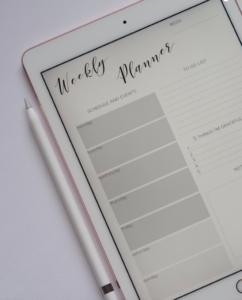Setting Goals in the New Year

By: Whole Journey Services
Setting Goals in the New Year
The new year is all about a fresh start. It is a time to set goals, make changes and resolutions. It can also be a great time to check in with your mental health and see what can be done to improve the way you feel and look at your life. Of course, these things don’t have to wait until the new year. They can be done at any point in your life.
Setting goals is easy but keeping motivated and achieving those goals is a whole different story. At Whole Journey, we frequently work with clients on setting and achieving goals that improve their mental and physical wellbeing. We can help you too. Some common goals for anxiety and depression sufferers are getting more sleep, slowing down in life, unplugging from screens, finding social connection, and engaging in more self-care.
Positive goal setting is an important part of mental health. If you don’t like something about your life, do something about it. Setting a goal and working towards it is an act of you taking control over your life. It is not always easy, as it shouldn’t be. Achieving results takes work but everyone can go after what they really want in life. And, everyone can take the necessary steps to take better care of their mental health.

Here are some of the tips our counselors and therapists give people for how to make and achieve goals:
1.) Think about what you want your future to look like.
How do you see your life in a year? Where do you want to make changes? What does the future look like once you have achieved your goals? What is most important to you? Brainstorm the areas you want to make improvements. List them out. Ask yourself — is this something you truly want? Is it important enough to prioritize and pour effort into?
2.) Decide and set specific goals.
Once you have figured out the areas in your life where you want to make improvements, set specific, measurable goals and give yourself a time frame. For example, you could decide you want to get more sleep so you can cope better with anxiety and depression and feel better mentally. Or, you might want to start journaling or meditating each day. Or, maybe you want to grow your career by the end of the year or give up alcohol for a few months. Whatever it is, be clear and detailed and in what you want.
3.) Determine how you will get there.
Once you have the goal, you need to determine how you are going to get there. Make a plan. Are you going to go to bed at 10 p.m. every night during the week, no exceptions? Are you going to wake up 20 minutes early each day to journal? Are you going to send a networking email once a week in an attempt to grow your career?
What smaller goals can you achieve each day or week to get you to the bigger result. Don’t just say “I want to do better with my mental health,” or “I want to grow my career.” Be specific in how you are going to get there.
4.) Write down your goals and tell a friend.
Everyone needs accountability whether to themselves or others. Write down your goals and put them somewhere you can see them each day (like your bedroom mirror or the back of your bedroom door). Tell a friend, family member, counselor, or therapist your goals so that you are accountable to someone. It is a lot harder to give up on a goal once you have told someone about it.
5.) Make sure your goals are realistic and measurable.
Your brain needs a deadline and some type of measurement to take a goal seriously, otherwise, it is easier to keep putting it off. Measurements boost motivation so you stay emotionally invested in your goal. Where do you want to be in 30 days? 60 days? 90 days? Be realistic. It is not realistic for you to gain 10 new clients in a week. It is not realistic to lose 20 pounds in a month. It probably isn’t realistic to sleep nine hours a night, but maybe seven is. It is not realistic for your anxiety and depression to vanish overnight but it can gradually get more manageable. Make sure your goals are attainable.
6.) Schedule check-ins.
It is important that you keep motivated to achieve your goal. Set specific times to check in with yourself or an accountability partner to evaluate your progress and see if any changes need to be made. What are you going to do to stay motivated? Maybe make your check-in once a month or every two weeks.
You could meet with your counselor or therapist twice a month and tell them what steps you are continuing to take to care for your mental health. How many days a week have you been meeting your goal of sleeping more? Do you need to change your bedtime again? Maybe you need to journal during lunch instead of in the morning?
7.) Reward yourself for meeting your goal.
Sometimes you need a little extra motivation to get to a goal. Maybe there is a conference you want to attend, a trip you want to take, or a piece of clothing or jewelry you want to purchase. Tell yourself if you achieve your goal you can have XYZ.
Help is Here
If you know you want to make changes in your life but are unsure of where to start or how to get there, consider seeking the help of a licensed mental health professional. A counselor or therapist can help you to develop a plan that works for your life. They can also help to identify specific changes that may help relieve mental health struggles like anxiety or depression. Everyone is capable of change, sometimes you just need a guide to help you get there.
Ready to begin counseling in Virginia?
Whole Journey works with clients throughout the state of Virginia and North Carolina via our online and telehealth counseling platforms. Our counselors are professionally trained in helping people to live healthier, happier lives. We want to see you thrive. Call our office at 757-296-0800 to schedule an appointment.




